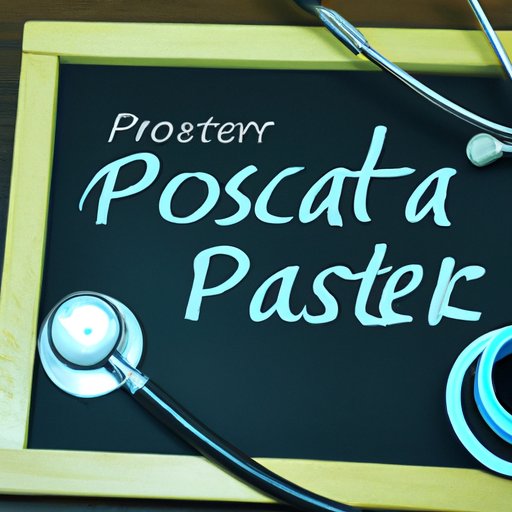
The Ultimate Guide to Preventing Prostate Cancer
Prostate cancer is a serious health concern for men, with over 191,000 new cases expected in 2020 alone. It’s the second most common type of cancer among men and can cause devastating consequences if left untreated. However, there are steps men can take to prevent and reduce their risk of developing prostate cancer. In this article, we’ll cover the most effective ways to prevent prostate cancer, from understanding the risk factors to adopting a healthy lifestyle.
Understanding the Risk Factors
Prostate cancer is a disease that affects the prostate gland, located just below the bladder in men. There are several risk factors that increase a man’s likelihood of developing prostate cancer, including age, family history, ethnicity, and lifestyle factors like poor diet and obesity.
If you’re concerned about your risk of prostate cancer, it’s important to talk to your doctor and understand your personal risk factors. This will help you take the necessary steps to prevent the disease from developing.
To mitigate your risk and prevent prostate cancer, it’s important to maintain a healthy lifestyle. Eating a balanced diet, maintaining a healthy weight, and getting regular check-ups are all key components of prostate cancer prevention.
Adopting a Healthy Diet
Eating a healthy diet is one of the most effective ways to prevent prostate cancer. Certain foods, like fruits and vegetables, have been shown to have anti-cancer properties. Other foods, like red meat and processed foods, can increase the risk of prostate cancer.
To prevent prostate cancer, it’s recommended that men eat a diet rich in fruits, vegetables, and whole grains. These foods are packed with essential vitamins and minerals that support overall health and protect against disease. Certain foods, like tomatoes, soy, and green tea, may be particularly beneficial for prostate health.
On the other hand, men should limit their intake of red meat, processed foods, and high-fat dairy products. These foods have been linked to an increased risk of prostate cancer.
If you’re looking to adopt a healthier diet, it’s important to tailor your approach to your individual needs. Consult with a registered dietician or healthcare provider to create a meal plan that works for you.
Maintaining a Healthy Weight
Obesity is a significant risk factor for several types of cancer, including prostate cancer. Men who are obese are more likely to develop aggressive forms of prostate cancer than men who maintain a healthy weight.
To reduce your risk of prostate cancer, it’s important to manage your weight through a combination of healthy diet and exercise. Aim to eat a balanced diet that is rich in fruits, vegetables, and whole grains, and low in processed foods and sugary beverages.
Regular exercise is also important for maintaining a healthy weight and reducing cancer risk. Aim to get at least 150 minutes of moderate-intensity exercise per week. This can include activities like brisk walking, cycling, or swimming.
Making lasting lifestyle changes can be challenging, but it’s important to set realistic goals and make sustainable changes over time. Consult with a healthcare provider or personal trainer to create an exercise plan that works for you.
Getting Regular Check-Ups
Early detection is key when it comes to treating prostate cancer. Men should begin getting regular prostate exams at age 50, or earlier if they have a family history of the disease.
A prostate exam is a simple procedure that involves a doctor or healthcare provider examining the prostate gland to check for abnormalities. While some men may feel uncomfortable or embarrassed about getting a prostate exam, it’s important to remember that the procedure is painless and can save your life.
If you’re feeling anxious or apprehensive about getting a prostate exam, talk to your doctor or healthcare provider. They can explain the procedure in detail and answer any questions or concerns you may have.
Reducing Exposure to Toxins
Environmental toxins and pollutants can increase the risk of several types of cancer, including prostate cancer. To reduce your exposure to these toxins, it’s important to take practical steps to create a safe and healthy living environment.
This may include avoiding exposure to tobacco smoke, using safe cleaning products and personal care products, and choosing organic foods whenever possible. It’s also important to avoid exposure to hazardous chemicals and pollutants in the workplace.
Creating a healthy living environment can be a daunting task, but it’s important to take small steps to reduce your exposure over time. Talk to your doctor or healthcare provider for additional tips and resources.
Conclusion
Preventing prostate cancer is possible through a combination of healthy lifestyle habits and regular check-ups. Eating a balanced diet, maintaining a healthy weight, and reducing exposure to environmental toxins are all key components of prostate cancer prevention. To protect your health and reduce your risk of developing prostate cancer, take action today and make positive lifestyle changes.
If you’re looking for additional resources and information on prostate cancer prevention, consult with your doctor or healthcare provider or visit reputable online sources like the American Cancer Society or the National Cancer Institute.




